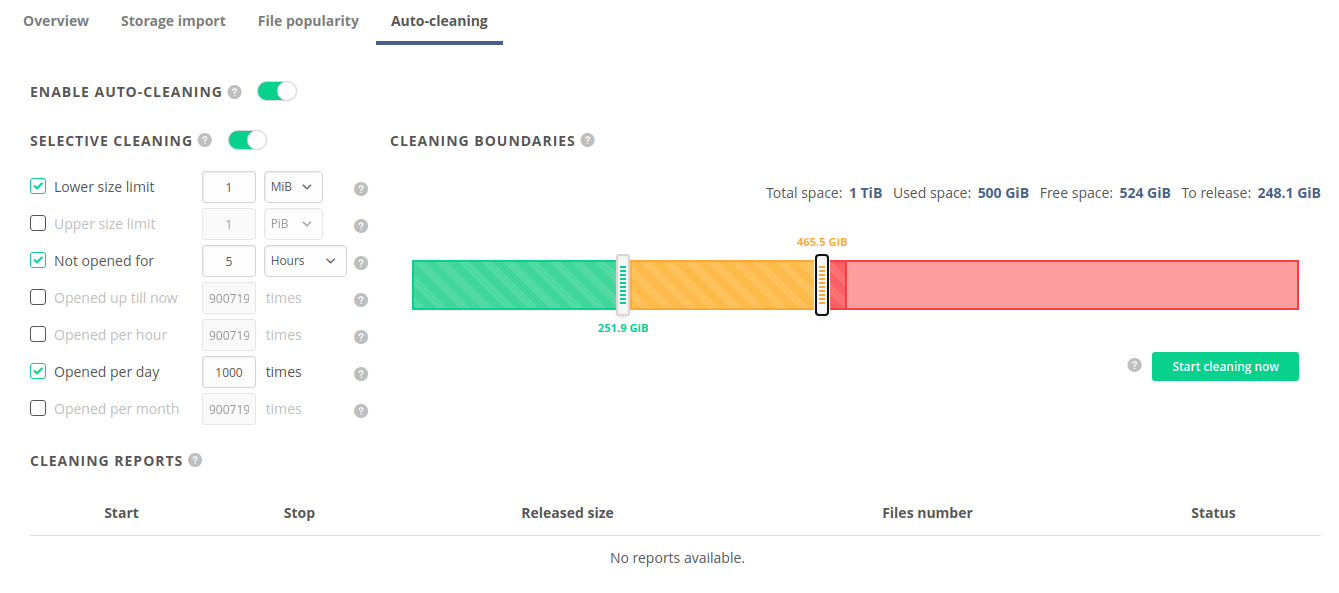# Auto-cleaning
As a prerequisite for understanding this chapter, we recommend that you familiarize yourself with the mechanism of file popularity.
The purpose of the auto-cleaning mechanism is to automatically maintain storage usage at a certain level and ensure that there is enough space for new replicas when performing continuous computations. The mechanism uses the statistics collected by the file popularity* to determine the least popular file replicas and evict them. The process is safe — only redundant replicas (duplicated on remote providers) are evicted. Eviction of replicas is coordinated among providers using a custom algorithm. It ensures that there is no risk of data loss, even in the case of simultaneous requests for deletion of replicas of the same file.
Each auto-cleaning run produces a report, which shows the number of removed replicas and the amount of released storage space.
# Basic setup
The mechanism can be enabled in the space configuration tab in the Oneprovider panel.
NOTE: The file popularity mechanism must be enabled to turn auto-cleaning on. Disabling file popularity disables auto-cleaning as well.
The user interface allows specifying low and high thresholds, corresponding to the amount of data stored on the local storage supporting given space:
- high threshold — when exceeded, an auto-cleaning run is triggered to evict redundant replicas.
- low threshold — when reached, the current auto-cleaning run is stopped.
The thresholds can be adjusted in the Spaces -> "Space Name" -> Auto-cleaning tab, in
the Oneprovider panel GUI (as shown below), or using the REST API.

# Selective rules
It is possible to filter the list of files obtained from the file popularity by enabling selective rules.
There are six rules for which ranges might be provided:
maxOpenCount— Files that have been opened not more thanmaxOpenCounttimes may be cleaned. The default value is9007199254740991 (2^53-1).minHoursSinceLastOpen— Files that have been closed at least this many hours ago may be cleaned. The default value is0.minFileSize— Only files whose size (in bytes) is not less than the given value may be cleaned. The default value is1.maxFileSize— Only files whose size (in bytes) is not greater than the given value may be cleaned. The default value is1125899906842624 (1 PiB).maxHourlyMovingAverage— Files that have a moving average of open operations count per hour not greater than the given value may be cleaned. The average is calculated in 24 hours window. The default value is9007199254740991 (2^53-1).maxDailyMovingAverage— Files that have a moving average of open operations count per day not greater than the given value may be cleaned. The average is calculated in 30 days window. The default value is9007199254740991 (2^53-1).maxMonthlyMovingAverage— Files that have a moving average of open operations count per month not greater than the given value may be cleaned. The average is calculated in 12 months window. The default value is9007199254740991 (2^53-1).
Disabled rules are ignored. A file replica must satisfy all enabled rules to be evicted.
# Starting run on demand
It is possible to forcefully start an auto-cleaning run by pressing the green button placed below the space occupancy bar. The run can be forcefully triggered even if the high threshold is not exceeded.
# Stopping run on demand
It is possible to forcefully stop an auto-cleaning run by pressing the red button placed below the space occupancy bar.
# REST API
All operations related to auto-cleaning can be performed using the REST API. Refer to the linked API documentation for detailed information and examples.
| Request | Link to API |
|---|---|
| Get auto-cleaning configuration | API (opens new window) |
| Update auto-cleaning configuration | API (opens new window) |
| Get list of auto-cleaning runs' reports | API (opens new window) |
| Get the report of auto-cleaning run | API (opens new window) |
| Trigger auto-cleaning run | API (opens new window) |
| Get current auto-cleaning status | API (opens new window) |